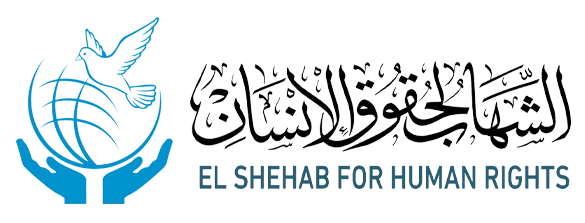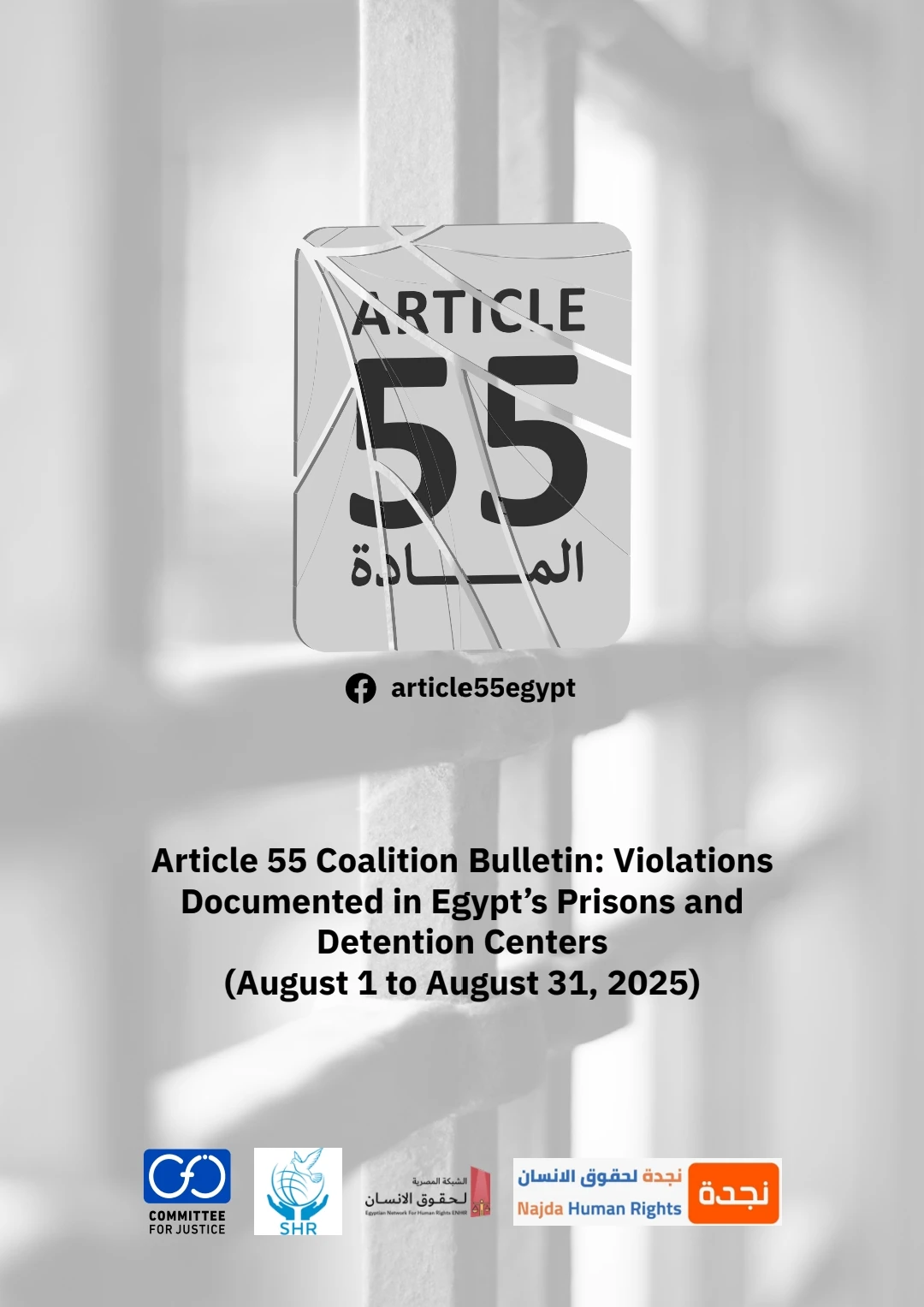Article 55 Alliance documents detention abuses in Egypt between 1 and 31 August 2025
The organizations of the Article 55 Alliance issued their monthly bulletin, highlighting key human rights, legal, and judicial developments in Egypt during August 2025, alongside a detailed record of abuses committed inside prisons and detention facilities run by the Egyptian security authorities.
Human rights, political, and economic situation in August
In August 2025, Egypt witnessed a wave of political, economic, social, and human rights developments that underscored the depth of its internal crisis and the complexity of the surrounding regional scene. The blockade of Gaza continued, with humanitarian aid stockpiled in Sinai prevented from entering despite repeated attempts, fueling public anger and political tension—particularly after authorities first announced acceptance of a negotiation deal, then backtracked while hinting at a possible ground invasion of Gaza.
Domestically, Senate elections were held amid unprecedented public apathy: official turnout was reported at 17 percent, while independent estimates suggested even lower figures, revealing a sharp decline in citizens’ trust in the electoral process.
On the economic front, criticism of the government mounted after press reports estimated that poverty now affects around 80 percent of Egyptians, with no serious reforms or tangible solutions in sight. At the same time, a televised statement by the Minister of Irrigation warning that Egypt will face a “severe water scarcity” in the coming years raised widespread alarm. The entry into force of the new rental law added further anxiety, especially among the elderly and pensioners who fear losing their homes without alternatives.
The human rights situation was no less severe. Authorities continued their security-driven approach toward the press and activists. Lina Attalah, editor-in-chief of Mada Masr, was summoned for questioning over a report on abuses in Badr 3 Prison, before being released on bail. Meanwhile, arrests of social media content creators continued under the pretext of protecting family values, with officials warning of penalties that could include life imprisonment. In the same context, human rights defender Mahienour El-Massry was released on bail after being charged with spreading false news, while several other prominent activists were released following lengthy interrogations. Nevertheless, thousands of activists and opponents remain in pretrial detention well beyond legal limits, while mass trials continue at Badr Criminal Court.
Prison conditions remained a critical issue, with a rising number of deaths among detainees due to medical neglect or suspected torture, alongside continuing hunger strikes and suicide attempts at Badr 3 Prison under a veil of official silence. This drew international criticism, as UN High Commissioner for Human Rights Volker Türk urged Egyptian authorities to end the practice of “rotation,” whereby detainees are charged in new cases at the end of their detention terms to block their release, stressing that this practice particularly targets activists, journalists, and lawyers.
At the same time, professional and labor protests grew, reflecting rising discontent with economic and social policies. Female employees of the General Authority for Literacy and Adult Education staged protests demanding permanent contracts; staff at the Institute of Engineering and Aviation Technology sounded the alarm after the dismissal of dozens of colleagues; and workers at Faragalla Food Industries in Alexandria held a sit-in over delayed wages and the failure to apply the minimum wage.
Together, these developments painted a picture of a multi-layered crisis in August 2025: a political crisis marked by weak popular participation and blocked democratic pathways; a deep economic and livelihood crisis reflected in widening poverty and lack of reform; a social crisis tied to threats to water security and housing; and a human rights crisis highlighted by continuing arrests and prison abuses, all under growing international scrutiny.
Abuses inside detention facilities
During August 2025, the Article 55 Alliance documented tragic conditions inside Egypt’s prisons and detention centers, recording 16 deaths of detainees and prisoners. Causes included direct torture, medical neglect, and inhumane detention conditions. The victims included university professors, doctors, young men, ordinary citizens, and even foreign nationals such as Sudanese citizen Mujahid Adel.
Among the most notable cases were: the death of Dr. Nagi El-Barnes, professor of dentistry at Alexandria University, after years of pretrial detention; the death of Dr. Atef Zaghloul from an untreated heart condition; and the death of 23-year-old Seif Imam following torture in Ain Shams Police Station. Other deaths were reported in police stations including Omraneya, Haram, Nagaa Hammadi, and Shubra El-Kheima, as well as in prisons such as Badr 3, Minya Liman Prison, and 10th of Ramadan Prison.
Meanwhile, Badr 3 Prison remained under total blackout, with reports of suicide attempts, hunger strikes, and authorities preventing detainees from attending their hearings. Other serious incidents included human rights activist Marwa Arafa suffering a pulmonary embolism due to medical neglect in 10th of Ramadan Prison; hunger strikes in Abu Zaabal 2 Prison; and collective punishment campaigns in Correctional and Rehabilitation Center no 6 in 10th of Ramadan City. In Minya Maximum Security Prison, families reported that prison authorities barred the entry of medications for chronic illnesses, leaving detainees without treatment. Female visitors also reported verbal and physical harassment during searches, adding another layer of abuse.
Conclusion and demands
The Article 55 Coalition affirms that the violations inside prisons and detention centers in Egypt are not individual incidents but reflect a systematic policy by the authorities, especially toward political detainees.
The policy of impunity has encouraged the repetition of these practices, as no official has ever been held accountable despite documented serious violations.
The coalition expressed deep concern about the rising number of deaths and the worsening conditions of detainees, and called for:
An urgent investigation into these violations.
Accountability of those responsible.
Compliance with international standards and Egyptian prison laws to ensure humane conditions that preserve the dignity of detainees.
Article 55 Coalition
Committee for Justice
El-Shehab Center for Human Rights
Egyptian Network for Human Rights
Najda for Human Rights

